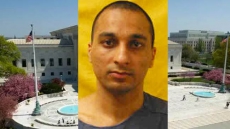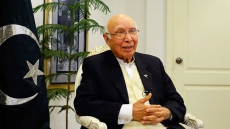Britain's senior-most Indian-origin minister Priti Patel, who had campaigned vehemently in favour of Brexit, believes today's historic referendum result in favour of Britain leaving the European Union (EU) will ultimately be good for India-UK ties.
Ms Patel, who has a seat in the UK Cabinet as minister for employment and also serves as Prime Minister David Cameron's Indian Diaspora Champion, is now expected to play an active role on the front-benches of British politics.
"India is a growing market with the fastest growing working age population of any other major economy - but it is a market that we are forbidden from striking a trade deal with because it is against EU rules...After we Vote Leave, the UK would be free to negotiate its own far-reaching trade deals with India and dozens of other growing economies. It will be a boost to India-UK ties," she had told PTI ahead of the vote.
The Gujarati-origin Conservative party minister has also repeatedly made personal references to her own Indian roots on the Vote Leave campaign trail.
"They (her parents and grandparents) worked hard to give us a good future and play a positive role in British life. But while we remain a member of the EU, the businesses that we have worked hard to establish are at risk from costly red tape and regulations from Brussels.
"By leaving the EU, we can replace EU red tape with sensible rules that promote the entrepreneurial spirit that we have in abundance.
We send 350 million pounds a week to Brussels, this is money that could be spent on our priorities like the NHS (National Health Service)," she said, alongside fellow Indian-origin first-time Conservative party MP Rishi Sunak - the son-in-law of Infosys chief Narayana Murthy.

One of the most contentious issues in the EU debate in the lead up to the in-out referendum has been immigration.
The 52-48 per cent result in favour of Brexit indicates that the crucial estimate of 16.8 per cent of undecided votes among the 1.2 million Indian-origin electorate of the UK seem to have been won over by at least some of their arguments.
She had also spearheaded a full-blown curry clash over the "unfair immigration rules" that favour EU migrants over non-EU workers from countries like India.
"Our curry houses are becoming the victims of the EU's uncontrolled immigration rules. By voting to leave the EU we can take back control of our immigration policies, save our curry houses and join the rest of the world," she had said.
She had been countered by long-serving Indian-origin Labour MP Keith Vaz, who expressed his dismay at the referendum's final outcome.
"Frankly, in a thousand years I would never have believed that the British people would have voted this way. I think that they voted emotionally rather than looking at the facts.

It'll be catastrophic for our country, for the rest of Europe and indeed the world," Mr Vaz said.
WHAT HAPPENS NEXT WITH THE BREXIT VOTE?
With Britain choosing to leave the EU in a historic referendum, it faces the prospect of a Conservative Party leadership contest and a long and hard road of negotiations between the UK and its leading trade partner.
The results of the referendum, which were confirmed as 51.9 per cent in favour of Brexit and 48.1 per cent against today, are not legally binding on the UK government.
However, the ruling Conservative party had promised the referendum as part of its manifesto pledge in the 2015 General Election and British Prime Minister David Cameron had repeatedly confirmed that the will of the people will be respected.
He reiterated that view in his resignation speech outside Downing Street this morning: "The British people have voted to leave the European Union and their will must be respected."

At a practical level, what this means is he has effectively kick-started a time-line for his own exit from Downing Street, expected by October, when a new Prime Minister will now have to take the Brexit mandate forward.
The most likely candidate is believed to be former London mayor Boris Johnson, who was the star campaigner for Vote Leave and often touted as Mr Cameron's successor.
Mr Cameron will chair a Cabinet meeting on Monday and soon after travel to Brussels to inform the European Council of Britain's referendum next Tuesday and Wednesday.
However, the road ahead is anything but clear-cut, with a number of factors coming into play.
The referendum has effectively triggered the process of a massive renegotiation process during which trade issues will be at the heart of talks to thrash out exactly how Britain's relationship with the EU will work in future - negotiations that many expect will last for years.
Quitting the EU could cost Britain access to the EU's trade barrier-free single market and means it must seek new trade accords with countries around the world.
The EU, taken as a whole, is the UK's major trading partner, accounting for 44 per cent of exports and 53 per cent of imports of goods and services in 2015.
Brexit has often been referred to by the British media as a difficult divorce after the break-up of a marriage of convenience.

Officially, the process involves invoking Article 50 of the 2009 Lisbon Treaty, which deals with the process of exit for any member country.
This will be the first time this article will be used, and indeed, tested as the only other country to exit the EU was Greenland back in 1982, when the EU was known as the European Economic Community (EEC).
Article 50 has provision for a two-year timeframe for negotiations, with scope to extend the negotiation period if all parties involved agree.
The year 2020 has been suggested by some experts as a potential timeline, when the next UK General Election is scheduled to take place.
As Mr Cameron stressed, "there will be no initial change in the way our people can travel, in the way our goods can move or the way our services can be sold".
However, his resignation and the need for a new Prime Minister to take charge of the negotiations has added a bigger question mark to the process ahead.
The European Commission has already indicated that it is not willing to wait for Britain to settle its own internal party politics to start the negotiation process.

In the interests of the EU's own future, European leaders are keen to conclude Brexit proceedings as quickly as possible to avert any further divisive referendums among its 27 other member-countries.
France has already expressed some murmurings of its own referendum.
"The UK should invoke Article 50 as soon as possible, however painful that process may be," said Jean-Claude Juncker, president of the European Commission, the executive branch of the EU.
He had warned before the vote: "Out is out".
On Saturday, the foreign ministers of the founding six member states - France, Germany, the Netherlands, Luxembourg, Italy and Belgium - will meet to discuss the implications of the British vote.
The deal the EU had struck with Cameron after months of negotiation earlier this year, has evaporated under a so-called "self-destruct" clause triggered by the referendum.
Now European leaders want to avoid being drawn into months and years of haggling over Britain's status, mounting pressure on invoking Article 50 instantly to set the two-year clock ticking and after that, the Treaties that govern membership no longer apply to Britain.
The terms of exit will be negotiated between EU's 27 counterparts, and each will have a veto over the conditions.
It will also be subject to ratification in national parliaments, which means MPs from individual member countries could squash aspects in their own Parliament.

Two vast negotiating teams will be created, with the EU side likely to be headed by one of the current commissioners and the British side most likely by a new Prime Minister.
Disentangling from the union is foreseen as the relatively simpler process, with renegotiating a lucrative trade deal and establishing acceptable tariffs and barriers with the UK's biggest trading partner seen as the toughest and most uncertain aspect.




